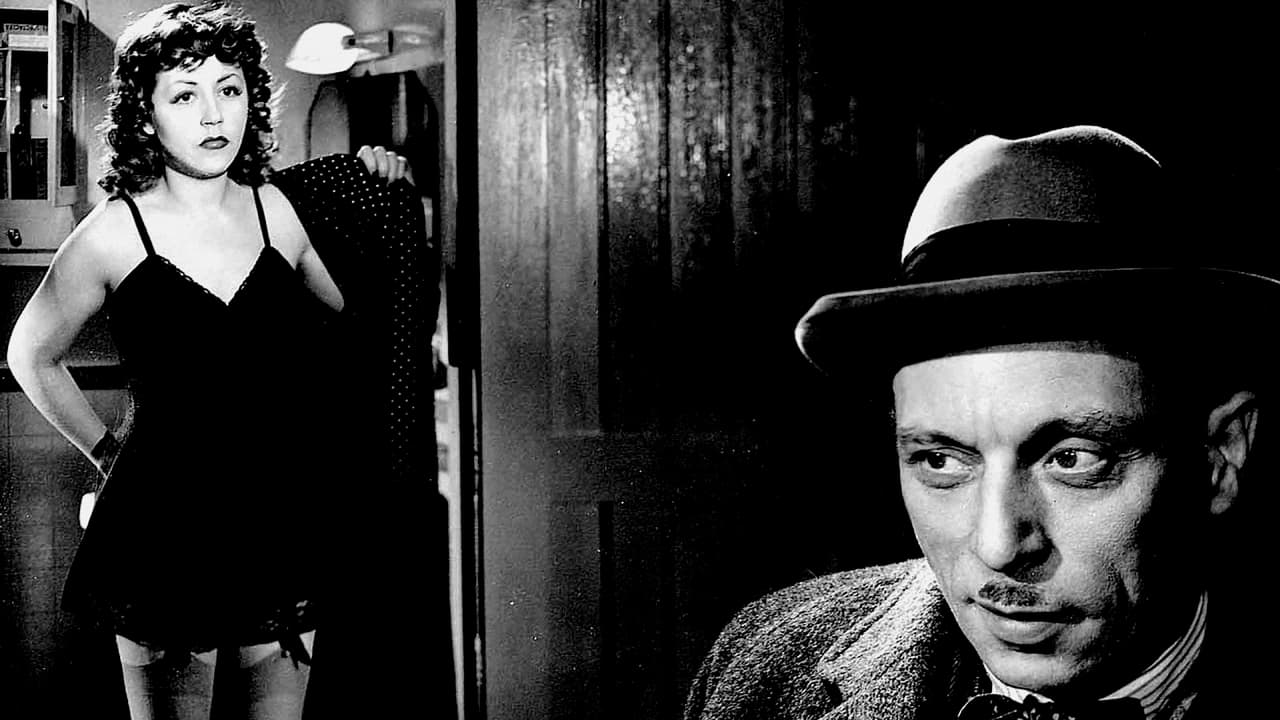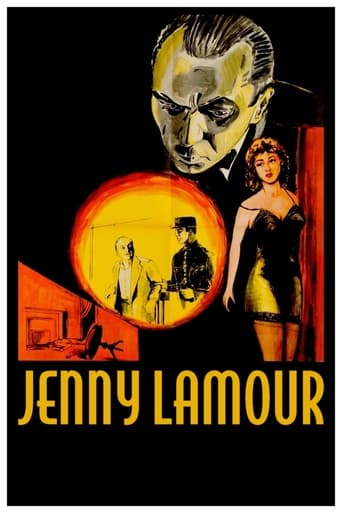

It's hard to believe that the same Henri-Georges Clouzot who made "Le Corbeau", "Le Salaire de la Peur" and "Les Diaboliques" made this terrific comedy-thriller. It's about the murder of a loathsome businessman and impresario and the three main suspects are one of his potential protégés, (Suzy Delair), her jealous husband, (Bernard Blier), and a female photographer, (Simone Renant). Louis Jouvet is the investigating inspector and his methods are, to say the least, somewhat unorthodox. The setting, superbly captured by Clouzot and his cameraman, Armand Thirard, is the seedy milieu of the Parisian music-halls. It's very funny and beautifully acted and less obvious than its surface suggests. But perhaps the most surprising thing is that the usually morose to the point of morbidity Clouzot could display such a light touch. A real treat.
... View MoreAs I have said in my review of his film LES ESPIONS (THE SPIES, 1957), Henri-Georges Clouzot was the French Hitchcock, and every bit as brilliant in his way, but with more humour and human compassion. This classic film by Clouzot has so many Hitchcockian touches of suspense and irony that it shows the similarity of the two men probably more than any other Clouzot film. See also my review of another of his masterpieces, LE CORBEAU (THE CROW, 1943). Clouzot is best known today for his film THE WAGES OF FEAR (LE SALAIRE DE LA PEUR, 1953, see my review), but I consider that an inferior work of his, unworthy of his talent. Sometimes he got a bit too carried away by 'the dark side'. We must also not forget his astonishing documentary portrait of Picasso, LE MYSTÈRE PICASSO (1956), which is possibly the most incredible film about a living painter ever made. The title of this film refers to the Paris Police Headquarters at 36 Quai des Orfèvres ('Quay of the Goldsmiths', because in the Middle Ages goldsmiths really did have their shops there), but the police do not even enter the story until more than half an hour has passed, as this is not really a detective film at all. The plot is so intricate and complex that it has less to do with whodunit than it has with Clouzot's main preoccupation in life, the deeper reaches of human psychology. The cast is universally excellent. Even tiny roles such as Joelle Bernard as Ginette (who sings beautifully, sitting in a chair with a fag in her mouth and a totally blank expression), Jeanne Fusier-Gir (1885-1973, veteran of 162 titles) as Pacquerette the coat lady at the Eden Theatre, and that of the old taxi driver Lafour played by Pierre Lauquey (1884-1962, veteran of an astounding 225 titles and one of France's most beloved character actors) are executed with perfection. Louis Jouvet, with his sad expression of a retired hound, lends a human face and a haunting and melancholy air to the inspector handling the murder case, the only love of his life being his sweet little boy who is 'the only thing I brought back from the Indies'. A great deal of this film was shot on location in Paris. One scene takes place at the famous restaurant Lapérouse at 51 Quai des Grands Augustins, the street where Picasso's studio still was at that date, I believe, and where Anatole France lived until his death. It is shocking to see the Postwar desolation of the Quai at that time (1946). The shop next door to the restaurant is vacant and for sale, and a few doors down one shop has its door blocked up with breeze blocks as if it had just been sealed by the Gestapo. Everywhere is hopelessly dingy and depressing, both outside and in. It is as if the German Army had left only minutes before. Clearly, Paris was not yet back on its feet by any means. In the film, everyone is wrapped up in overcoats indoors because of the lack of heating everywhere, and there is mention of having run out of coal for a small coal stove. People are seen wiping their armpits because of sweating too heavily under all their woollen jumpers. The star of the film is the overwhelmingly extrovert and cheeky Suzy Delair, who was Clouzot's live-in girlfriend. Words fail me; you have to see her to believe her in the role of Jenny Lamour. Her friend, the striking and brooding blonde Dora, played by Simone Renant, is secretly in love with her with 'a love that can never speak its name'. Jenny's husband Maurice is played by popular French actor Bernard Blier (a Gallic taste, less appealing to us perhaps, but then French men never come up to the standard of all those amazing French women, do they? And what do the French women see in them?). Much of the cinematic brilliance of this film is found in its moments of intense suspense. At one point, a murder address scribbled on a scrap of newspaper is picked up during an interview by the inspector and used to light his pipe. The pipe goes out and he uses it a second time. Meanwhile, the two people being interviewed are both in agonies of anxiety that he will glance at the paper and see the evidence. But he does not. Toscano's Gypsy Orchestra features in the film, and it plays the Gypsy tune 'Doina' extremely loud while the inspector is carrying out a particularly intense crime interview in the same room. This heightens the tension to an incredible degree. And there is one other occasion when Clouzot uses loud background noise to intensify suspense in the foreground. This may well be derived from Orson Welles's use of 'sound as confusion' techniques. The murder mystery in the film is a bizarre web of coincidences (such as an unexpected car theft taking place so that one of the suspects who has thus lost his mode of transport has to run frantically for 45 minutes to complete his alibi) and misunderstandings, but the film is really about the psychologies of the people involved in all of these complications. Clouzot wishes to explore why people do stupid things, how incompetent they really are, how vain many of their motives are, and how unexpected the ensuing events can become. None of the main protagonists in this film is really a bad person, but most of them are fools. The least demonstrative and most repressed character in the story, the secret lesbian, is the only one who is willing to make a sacrifice for another person or behave sensibly. The lonely and mournful inspector says to her late in the film: 'I have developed a sympathy for you. You and I have something in common. Neither of us has any chance of ever getting a woman.'
... View MoreIn the postwar Paris, the accompanist pianist Maurice Martineau (Bernard Blier) is a jealous man from the upper class married with the ambitious singer Marguerite Chauffournier Martineau, most known by her artistic name Jenny Lamour (Suzy Delair), a woman with past from the lower classes. When the lecher but powerful Georges Brignon (Charles Dullin) harasses and invites Jenny for dinner promising a role in a film, Maurice goes to the restaurant and threatens Brignon. A couple of days later, Jenny tells Maurice that she is going to visit her grandmother in another town. However, her husband finds a piece of paper hidden in the kitchen with Brignon's address. Maurice goes to the theater to have an alibi and heads to Brignon's manor during the show with the intention of killing the old man. However, he finds Brignon's house open and the man dead on the floor. When he leaves the crime scene, his car is stolen and Maurice has to walk back to the theater. Meanwhile, Jenny arrives in the house of the lesbian photographer Dora Monier (Simone Renant), who is an old friend of Maurice and has a crush on Jenny, and tells Dora that she has just killed Brignon. But Jenny notes that she had forgotten her fur on the couch in the living room of Brignon's house and Dora takes a cab to retrieve the stole. Inspector Antoine (Louis Jouvet) is assigned to investigate the case and sooner he visits Jenny, Maurice and Dora to check their alibis for that night in the beginning of his investigation. "Quai des Orfèvres" is an amusing story of an efficient detective investigating a murder in a comedy of errors of the three lead suspects. Henri-Georges Clouzot is one of the best French directors ever and "Quais des Orfèvres" is another gem in his filmography. The witty screenplay has many twists and is supported by the magnificent cinematography in black-and-white and awesome performances. Bernard Blier, the father of Bertrand Blier, is perfect in the role of a jealous cuckold without confidence in his wife and self-respect. Suzy Delair performs an ambitious woman that has a past with lovers and wants to climb positions in the show-business, but loves her husband. Simone Renant is great in the role of a lesbian photographer. But who steals the film is Louis Jouvet, in the role of a detective that seems to be naive, but is capable to find the truth that each character intends to hide. My understanding is that Antoine might be gay since he does not like women. My vote is eight.Title (Brazil): "Crime em Paris" ("Crime in Paris")
... View MoreClouzot followed Le Corbeau, where no one knew who was penning the poison thus everyone was suspected, with another masterpiece, Quai des Orfevres four years later in which we know from the outset (or think we do) whodunnit. Top-billed Louis Jouvet doesn't appear for forty minutes by which time Clouzot has established a rich milieu of Music Hall, music publishers, etc and a fine cast of colourful characters; Angela Lansbury lookalike (Lansbury appeared in Woman of Paris that same year) Suzy Delair scores as the chanteuse whose desire to improve her lot inspires the jealousy of her husband/accompanist Bernard Blier who follows her to the home of an elderly letch only to find he is already dead. From here things go seriously wrong, his car is stolen before he leaves the premises so his pre-arranged alibi is out the window whilst meanwhile, unknown to him, his wife confesses to the murder to the photographer neighbour, a closet lesbian in love with her, who volunteers to return to the crime scene and retrieve Delair's scarf and as long as she's there,thoughtfully wipes her prints of the murder weapon, a champagne bottle. At this point investigator Jouvet gets involved and from then on it's a case of keeping the plates spinning in the air. Clouzot's output was relatively small but virtually all of it was, as Spencer Tracey said in another context, 'cherce', with Le Salaire de peur and Les Diaboliques still to come. In short this is a must for French cinema buffs.
... View More